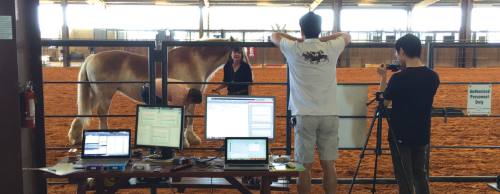Georgetown-based Ride On Center for Kids has worked with Southwestern University, Baylor University and Texas A&M University to study how horses can help improve quality of life, depression, and physical or mental challenges in some children and military veterans.
ROCK provides equine-assisted therapies and activities for children, adults and veterans with cognitive, emotional and physical challenges. Its clients range from ages 2-88 years old and come from throughout Central Texas, including Bell, Travis and Williamson counties.
ROCK founder and CEO Nancy Krenek said the organization strives to be a “trusted” leader in research about equine therapies.
In mid-May, ROCK completed a two-year, multisite study with Baylor examining the effect that equine therapy has on quality of life and depression in veterans, Krenek said.
Beth Lanning, associate professor and director of the undergraduate public health program at Baylor, said the study involved 91 veterans, 51 of whom went through therapeutic riding sessions that teach veterans how to ride the horses and care for them. Baylor is still processing the data from the study and plans to publish an article about the findings. In November, the study’s results will be presented at the National Professional Association of Therapeutic Horsemanship Conference.
“Some of the things that I’ve been able to glean from the qualitative data … the common theme is that when [the veterans] are at the barn and with the horse, they feel safe,” Lanning said.
Although the feeling of safety can be somewhat diminished when the veteran leaves the riding facility, overall the veteran experiences improvement in quality of life and feels more physically and emotionally safe than he or she did prior to the therapeutic riding sessions, she said.
“The horse seems to bring them out of their isolation,” she said. “It’s a type of intervention that allows them to start to process … some of the things they’ve gone through … both in a physically and emotionally safe place.”
Lanning said for insurance companies to begin to reimburse patients for therapeutic riding sessions, additional and larger studies must be done and likely in conjunction with lobbyists to advocate.
ROCK’s studies include a partnership with Texas A&M to document movement of the horse and the horse rider. Another study conducted with Baylor measured the effect a horse has on children with diagnosed autism, which revealed positive change, Krenek said.
Krenek said because of the sensitive nature of horses, they recognize vulnerability in people. If a person is feeling angry or upset, the horse picks up on that emotion, which causes the person to learn to change their behavior out of fear of upsetting the horse, she said. That skill is also translatable to work, family and school, she said.
“If we are going to take children and adults and veterans that have special needs of some sort and put them on a 1,200-pound animal, then we need to validate what we’re doing and why we’re doing it,” Krenek said. “By doing research, we have evidence-based data … that supports the industry.”
The positive therapeutic effects of interaction with horses dates back to the ancient Greeks when people gave horseback rides to “raise the spirits of the chronically and incurably ill,” according to the Journal of Rehabilitation Research & Development of the U.S. Department of Veterans Affairs. In 1875, the first systematic study of therapeutic riding was reported and revealed after prescribing pony riding as a treatment for certain conditions, a French physician concluded that “riding was helpful in the treatment of certain types of neurological paralysis.” He noted improvement in posture, balance, and joint movement and a “striking increase in morale,” according to the journal.
Krenek said ROCK recently purchased 20 acres of land near its current property with the aim of building a second riding arena, for which ROCK is seeking donations.
“The reason the horse is so effective … for those that it’s a good fit, [the horse] seems to tap into whatever the person needs,” Krenek said.




